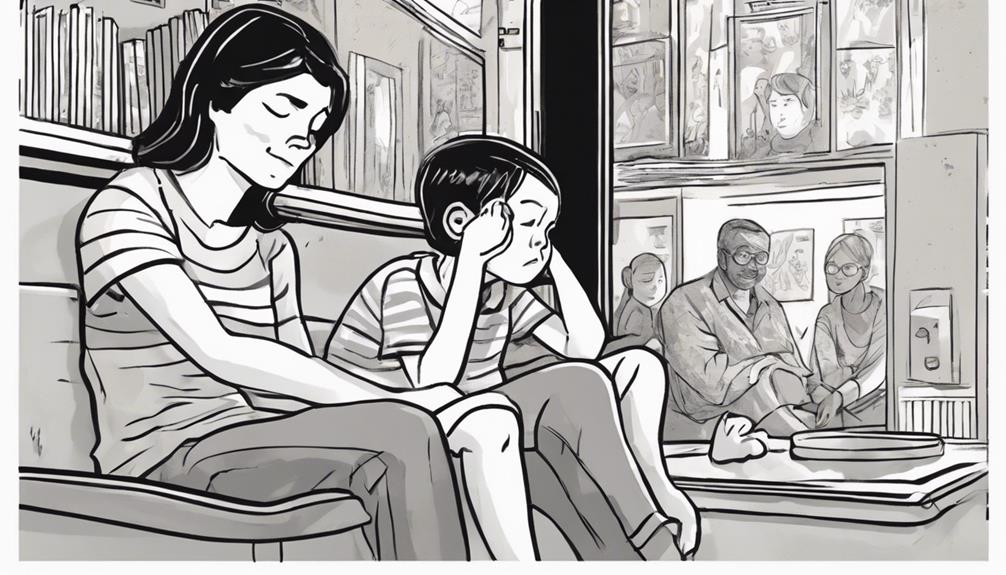Parenting Tips
Strengthening Parent-Child Connection Through Empathy
Keen on nurturing stronger parent-child bonds? Discover how empathy shapes relationships, fosters understanding, and builds trust in families.

Empathy plays a key role in **building stronger bonds** between parents and kids, fostering **understanding** and trust. Listening closely, making eye contact, and repeating what you hear show you care and **validate their feelings**. Trust grows from **being genuinely interested**, leading to open chats and respect. Creating a **safe space** for kids to be themselves **nurtures** emotional links. Empathy shapes family life, promoting **supportive environments** and healthier talks through understanding and feelings. This foundation is critical for developing **strong, lasting relationships**. Stick around for more tips and secrets to **enhance these connections**.
Key Takeaways
- Practice active listening to understand children's feelings and perspectives.
- Show empathy by acknowledging and validating children's emotions.
- Create a safe and supportive environment for open communication.
- Foster trust through genuine interest and non-judgmental listening.
- Strengthen the parent-child bond by demonstrating kindness and consideration.
Importance of Empathy in Parenting
Empathy plays a pivotal role in effective parenting, fostering stronger emotional connections and understanding between parents and children. When parents empathize with their children, they show that they care about their feelings and experiences. This emotional connection helps children feel heard, valued, and supported.
By putting themselves in their children's shoes, parents can better understand their perspectives and respond in a more compassionate and understanding manner. Empathy also teaches children how to relate to others with kindness and consideration. It builds trust and mutual respect within the parent-child relationship, creating a safe and supportive environment for open communication.
Active Listening Techniques for Connection

To enhance parent-child connection, employing active listening techniques is essential. Active listening involves fully concentrating, understanding, responding, and remembering what the child communicates. Maintaining eye contact, nodding, and providing verbal cues demonstrate active engagement.
Avoid interrupting or imposing solutions prematurely, instead, focus on comprehending the child's perspective. Paraphrasing or reflecting back what the child expresses confirms understanding and validates their feelings. Using phrases like 'I hear you' or 'That must be challenging' acknowledges their emotions.
Building Trust Through Understanding

Building trust with children starts by actively listening and understanding their perspectives and emotions. By demonstrating genuine interest in a child's thoughts and feelings, parents can create a sense of security and openness within the parent-child relationship.
When children feel heard and understood, they're more likely to trust their parents and share their innermost thoughts. This trust forms the foundation for a strong and healthy connection between parents and children.
Through empathetic listening and acknowledging a child's emotions without judgment, parents can cultivate a safe space where children feel respected and valued. Building trust through understanding involves being present, attentive, and responsive to a child's needs, ultimately strengthening the bond between parent and child.
Nurturing Emotional Bonds With Children

Nurturing emotional bonds with children involves creating a safe and supportive environment where openness and understanding thrive. It's essential to provide a space where children feel valued and heard, allowing for authentic expression of thoughts and emotions.
By actively listening, showing empathy, and encouraging open communication, parents can deepen their emotional connection with their children. This process requires patience, genuine interest, and a willingness to understand the child's perspective without judgment.
Through fostering trust and mutual respect, parents can strengthen the bond with their children, leading to more meaningful interactions and a sense of security within the family unit. Building emotional bonds takes time and effort but is pivotal for establishing a strong foundation for healthy parent-child relationships.
Impact of Empathy on Family Dynamics

Empathy plays a significant role in shaping the dynamics within a family unit by fostering understanding and emotional connections between members. When family members empathize with one another, they create a supportive environment where feelings are acknowledged and respected. This leads to increased trust, open communication, and a sense of mutual respect.
By listening actively and showing empathy, parents can strengthen their relationships with their children and promote healthier interactions. Empathy helps family members feel heard and valued, improving overall family dynamics. It encourages cooperation, enhances understanding, and builds a foundation of trust that's essential for a strong family bond.
Frequently Asked Questions
How Can Parents Practice Empathy in Challenging Situations?
Parents can practice empathy in challenging situations by actively listening, showing understanding, and acknowledging emotions. By avoiding interruptions, paraphrasing to confirm comprehension, and refraining from immediate solutions, parents create a safe space for open communication.
Making eye contact, nodding, and using validating phrases like 'I hear you' fosters trust and connection. Empathy builds bridges, strengthens relationships, and nurtures mutual respect between parents and children.
What Are Common Barriers to Effective Active Listening?
Common barriers to effective active listening include distractions like phones or background noise, personal biases that hinder understanding, and a lack of genuine interest in the speaker.
Emotional reactions, such as defensiveness or impatience, can also impede active listening. Inadequate focus on the speaker's words and feelings, as well as preconceived judgments, further obstruct effective communication.
Overcoming these barriers requires self-awareness, patience, and a genuine desire to connect with the speaker.
How Can Parents Help Children Feel Emotionally Secure?
To help children feel emotionally secure, parents can prioritize active listening. By truly engaging with their child's feelings and thoughts, parents create a safe space for open communication.
This involves giving undivided attention, acknowledging emotions, and refraining from judgment. Encouraging children to express themselves without fear of criticism fosters trust and mutual respect.
Ultimately, active listening promotes a strong parent-child bond built on empathy and understanding.
What Role Does Vulnerability Play in Building Trust?
Vulnerability plays an essential role in building trust by fostering openness and authenticity in relationships. When individuals allow themselves to be vulnerable, they show their true selves and create space for genuine connection.
This act of sharing personal thoughts and emotions can lead to deeper understanding and empathy between people. By embracing vulnerability, individuals demonstrate honesty and create a foundation of trust that can strengthen bonds and foster healthier relationships.
How Does Empathy Improve Conflict Resolution Within Families?
Empathy plays a pivotal role in improving conflict resolution within families. By actively listening and acknowledging each other's emotions, family members can better understand perspectives and work towards solutions collaboratively.
Empathy fosters a sense of connection and mutual respect, reducing the intensity of conflicts. It encourages open communication, leading to more effective problem-solving and preventing escalations.
How can Empathy Help in Communicating Effectively with Teenagers?
When it comes to navigating effective communication with teenagers, empathy plays a crucial role. By putting yourself in their shoes and understanding their perspective, you can build trust and rapport. Acknowledging their emotions and validating their experiences can lead to more meaningful and productive conversations.
Conclusion
To sum up, empathy serves as a powerful tool in strengthening the bond between parents and children. By actively listening, understanding, and validating emotions, parents can create a safe and supportive environment for open communication and trust to flourish.
Building a foundation of empathy not only fosters deeper connections and enriched relationships but also paves the way for healthy family dynamics. Remember, empathy is the key to revealing the true potential of parent-child relationships.
Parenting Tips
Unleash Your Public Speaking Potential With Confidence
Dive into mastering public speaking with confidence by learning essential techniques to captivate your audience and overcome stage fright.

Boost your public speaking skills by nailing the basics. Know your audience and design a clear speech layout. Tackle stage fright with deep breaths and expressive body language. Handle Q&A sessions calmly and confidently. Use visual aids to make your point stronger. These tips will unlock your public speaking potential and skyrocket your confidence.
Key Takeaways
- Practice speaking in front of a mirror multiple times for confidence.
- Utilize deep breathing and visualization techniques to overcome stage fright.
- Tailor your speech to connect with the audience on a personal level.
- Embrace non-verbal communication through eye contact and confident body language.
- Use clear speech structure with a compelling opening and strong conclusion.
Preparation for Public Speaking
Preparing meticulously for public speaking is essential for delivering a successful and impactful speech. Researching audience demographics, interests, and knowledge levels is vital. Understanding the importance of public speaking for communication skills, confidence, career growth, leadership, and effective idea conveyance is fundamental.
Practice speaking in front of a mirror and rehearse multiple times to build confidence. Creating a clear speech structure and tailoring content to connect on a personal level are key components. By focusing on these preparation steps, speakers can enhance their delivery and captivate their audience effectively.
Mastering Speech Structure

To excel in public speaking, mastering the structure of your speech is paramount for engaging and effectively conveying your message to the audience.
Begin with a compelling opening to grab attention, followed by a clear introduction of the main points. Organize these points logically, supporting them with relevant examples or stories. Guarantee a smooth shift between sections to maintain coherence.
End with a strong conclusion that reinforces your key message and leaves a lasting impact. Practice your speech multiple times to familiarize yourself with the content, tone, pace, and body language.
Embrace non-verbal communication through eye contact, confident posture, and effective gestures. Utilize visual aids sparingly to enhance, not overpower, your message.
Overcoming Stage Fright

Conquering stage fright is an essential aspect of delivering a successful public speech, requiring mastery of self-confidence and effective coping strategies. When facing stage fright, deep breathing exercises and visualization techniques can help calm nerves. It is important to focus on the message, engage the audience, and start with a strong opening. Enhancing presence through confident body language, eye contact, gestures, and voice modulation can also alleviate anxiety. Avoiding fidgeting, speaking clearly, varying pitch, and controlling the pace of speech are key strategies to overcome stage fright. Here is a table summarizing key points:
| Stage Fright Coping Strategies | Examples | Effectiveness |
|---|---|---|
| Deep breathing exercises | Diaphragmatic breathing | Calms nerves |
| Visualization techniques | Imagining a successful speech | Boosts confidence |
| Focus on the message | Engage with the audience | Reduces anxiety |
| Confident body language | Maintaining good posture | Enhances presence |
| Voice modulation | Varying pitch and pace | Controls nervousness |
Handling Q&A Sessions

When moving from delivering a speech to interacting with the audience in a Q&A session, it is important to maintain composure and actively listen to questions being posed.
During Q&A sessions, follow these key strategies:
- Listen Carefully: Pay close attention to each question to provide relevant responses.
- Remain Calm: Stay composed and confident, even if faced with challenging or unexpected queries.
- Engage with Gratitude: Thank the audience for their questions and show appreciation for their participation.
Visual Aids and Message Reinforcement

Utilizing visually appealing aids is pivotal in reinforcing the message delivered during a public speech. Visual aids, such as slides, props, or multimedia presentations, serve to enhance audience understanding and retention of key points.
When incorporating visual elements, it is essential to keep them simple, clear, and complementary to the spoken content. Overloading the audience with visuals can distract from the message, so it's essential to strike a balance that guarantees a memorable speech delivery.
Effective non-verbal cues, gestures, and body language can further reinforce the intended message, creating a cohesive and impactful presentation. Establishing a strong presence on stage through confident posture, eye contact, and appropriate hand movements enhances the overall delivery of the speech.
Frequently Asked Questions
How Can I Effectively Engage a Diverse Audience?
To effectively engage a diverse audience, tailor your content to resonate with their backgrounds and interests. Utilize engaging storytelling, interactive elements, and inclusive language. Encourage participation, listen actively, and adjust your delivery to guarantee everyone feels acknowledged and valued.
What Are Some Strategies to Handle Technical Difficulties During a Presentation?
In the field of public speaking, handling technical glitches demands a calm demeanor, quick thinking, and preparedness. Confirm backup plans for equipment failures, practice with the technology, and maintain composure to troubleshoot effectively.
How Do I Maintain Audience Interest Throughout a Longer Speech?
To maintain audience interest throughout a longer speech, engage them with compelling stories, interactive elements, and relevant examples. Vary your tone, pace, and delivery to keep them attentive. Use visuals sparingly to supplement key points and enhance message retention.
What Are Some Tips for Incorporating Humor Into a Serious Speech?
Incorporate humor strategically by using relevant anecdotes, witty remarks, or light-hearted observations to break tension, engage the audience, and make complex topics more digestible. Balance humor with professionalism to maintain credibility and impact.
How Can I Address Audience Skepticism or Resistance During a Presentation?
To address audience skepticism or resistance during a presentation, employ strategic storytelling, provide credible evidence, acknowledge opposing viewpoints respectfully, and engage in active listening. Build trust by establishing common ground and demonstrating empathy towards differing perspectives for a more receptive audience.
Conclusion
To sum up, mastering the art of public speaking requires careful preparation, confident delivery, and effective message reinforcement. By honing speech structure, overcoming stage fright, and utilizing visual aids strategically, individuals can unlock their full potential as speakers.
Embracing these practices will not only enhance communication skills but also leave a lasting impact on the audience. With dedication and practice, anyone can become a compelling and confident public speaker.
Parenting Tips
Youth Drive Eco-Friendly Revolution Against Plastics
Unleash the power of youth in the fight against plastic pollution by discovering their innovative eco-friendly initiatives and impactful contributions.

The youth are at the forefront of combating single-use plastics, advocating for sustainable alternatives to tackle the pressing issue of plastic pollution. With 14 million tons of plastic entering the oceans annually, urgent action is essential. Despite challenges like lack of awareness and cheap plastic production, promoting eco-friendly practices, such as using reusable items, and supporting local businesses with green initiatives can make a significant impact. Engaging students in environmental efforts not only instills responsibility but also empowers them to lead the eco-friendly revolution. By educating and involving the younger generation, a cleaner and healthier environment can be achieved.
Key Takeaways
- Educate students on plastic alternatives and eco-friendly practices.
- Empower students to advocate for policy changes promoting sustainable initiatives.
- Encourage students to lead by example in reducing plastic consumption.
- Implement green practices within educational settings to inspire eco-friendly habits.
- Foster a sense of responsibility in students to drive the eco-friendly revolution against plastics.
Impact of Single-Use Plastics
Annually, a staggering 14 million tons of plastic find their way into Earth's oceans, highlighting the detrimental impact of single-use plastics on the environment.
Despite campaigns like Keep Britain Tidy, the persistence of single-use plastics poses a significant threat to marine ecosystems. Organizations are actively working towards replacing these plastics with sustainable alternatives to mitigate the environmental damage caused.
The youth, in particular, are affected by the toxic repercussions of plastic pollution. As plastic waste continues to accumulate in oceans, urgent action is required to address this global issue.
It is essential to raise awareness about the consequences of single-use plastics and promote eco-friendly practices to combat this growing environmental challenge.
Challenges in Reducing Plastic Waste

Despite efforts to raise awareness and promote eco-friendly practices, reducing plastic waste globally presents numerous challenges that hinder progress towards a sustainable future. One major challenge is the lack of awareness on plastic waste and its environmental impact.
Disparity in reducing single-use plastics globally also poses a significant obstacle. The cheap production of plastics makes it challenging to phase them out in favor of more sustainable options.
Additionally, the need for widespread eco-friendly practices is essential but often not implemented on a large scale. Education on the effects of pollution caused by plastics is lacking, further complicating efforts to reduce plastic waste effectively. These challenges highlight the complex nature of addressing plastic waste on a global scale.
Promoting Sustainable Practices

One significant approach to addressing the challenges in reducing plastic waste is by promoting sustainable practices that prioritize eco-friendly alternatives and responsible waste management.
By advocating for the use of eco-friendly alternatives to single-use plastics, such as reusable bags and water bottles, individuals can greatly reduce their plastic consumption.
Supporting local businesses that implement eco-friendly initiatives and encouraging schools to adopt sustainable practices are also effective ways to promote a more environmentally conscious lifestyle.
Additionally, promoting important waste management, such as proper recycling and disposal of plastics, plays a vital role in minimizing the environmental impact of plastic waste.
Engaging Students in Environmental Initiatives

Involving students in environmental initiatives is crucial for cultivating a culture of sustainability and fostering a sense of responsibility towards the environment.
By educating students on plastic alternatives and empowering them to demand eco-friendly products, schools can play a significant role in shaping future environmental leaders.
Implementing green practices within educational settings, such as reducing printing waste and promoting sustainable alternatives, helps students understand the importance of environmental conservation.
Through these initiatives, students can learn the value of responsible waste management and contribute to minimizing their ecological footprint.
Leading Eco-Friendly Revolution

Educating and empowering students on eco-friendly practices is fundamental in leading the eco-friendly revolution towards sustainable living. By instilling a sense of responsibility and understanding the impact of their actions, students can become catalysts for change. Here is a table showcasing key strategies to lead the eco-friendly revolution:
| Strategies | Description |
|---|---|
| Implement Green Practices | Schools can adopt sustainable practices like recycling programs and reducing plastic waste. |
| Advocate for Policy Changes | Students can push for policy changes at school and community levels to promote eco-friendly practices. |
| Lead by Example | Embracing sustainable practices, using reusable items, and volunteering to make a positive impact. |
| Educate and Empower | Educating peers, sharing facts, and demanding eco-friendly products to create a culture of environmental responsibility. |
Frequently Asked Questions
How Can Youth Effectively Influence Companies to Prioritize Recyclability?
Youth can effectively influence companies to prioritize recyclability by engaging in advocacy efforts, leveraging social media platforms to raise awareness, collaborating with environmental organizations, and participating in sustainable initiatives to showcase the demand for eco-friendly practices.
What Innovative Ways Can Schools Implement to Reduce Printing Waste?
To reduce printing waste, schools can implement digital platforms for assignments, utilize double-sided printing, encourage electronic submissions, promote paperless communication, establish printing quotas for students, and educate on eco-friendly practices. These innovative methods foster sustainability and cost-efficiency.
Are There Specific Strategies to Empower Students to Demand Eco-Friendly Products?
To empower students to demand eco-friendly products, schools can educate on sustainable options, encourage activism for environmentally responsible choices, collaborate with local businesses promoting green initiatives, and integrate eco-friendly practices into the curriculum.
How Can Local Businesses Be Supported in Implementing Eco-Friendly Initiatives?
Local businesses can be supported in implementing eco-friendly initiatives by providing financial incentives, offering training on sustainable practices, connecting them with eco-conscious suppliers, and promoting their efforts through community partnerships. Collaboration is key for lasting impact.
What Are the Key Steps to Fostering a Culture of Environmental Responsibility in Schools?
Fostering a culture of environmental responsibility in schools involves educating students on eco-friendly practices, empowering them to demand sustainable solutions, implementing green initiatives, reducing waste, and advocating for policy changes at school and community levels.
Conclusion
To sum up, crucially, the youth-led eco-friendly revolution against plastics showcases the power of collective action in combating environmental threats. By promoting sustainable practices, engaging students in initiatives, and leading the charge for change, these young activists are driving a dynamic shift towards a cleaner, greener future.
Their dedication and determination to tackle the challenges posed by plastic waste serve as a shining example of environmental stewardship and responsibility. Let us all join in this essential mission to protect our planet for generations to come.
Parenting Tips
Unleashing Potential: Bruce Lee's Inspirational Lessons
Discover the transformative power of Bruce Lee's teachings and unlock your potential through philosophy, physical training, and strategic thinking.

Bruce Lee’s life lessons push for growth through **philosophy**, exercise, and smart thinking. Conquering challenges, using strengths in conflicts, and building a good work ethic by training the whole body are key. Staying calm and thinking strategically matter. There are efforts to keep his legacy alive with historic spots and filming sites. You can join in through online groups and social media. As a long-time teacher, the author shares cool ideas on growing personally and learning. Check out related info and chat with others for even more knowledge. **Bruce Lee’s lessons inspire.**
Key Takeaways
- Philosophy of hard work and continuous improvement for personal growth.
- Leveraging strength for conflict resolution and strategic responses.
- Training every part of the body for a strong work ethic.
- Preserving Bruce Lee's legacy through historic locations and landmarks.
- Engage with online community for educational insights and inspiration.
Influence on Personal Growth
Bruce Lee's philosophy of physical training and hard work propelled me to conquer personal challenges and embrace a mindset of continuous improvement. His belief in leveraging the enemy's strength to handle conflicts calmly resonated deeply within me.
The emphasis he placed on training every part of the body inspired a strong work ethic that I aim to embody daily. One of the key takeaways from Lee was the ability to remain composed in the face of provocation and respond strategically.
Witnessing how he lived out his teachings emphasized the importance of leading by example, a principle I now hold close to my heart. Bruce Lee's influence continues to shape my approach to personal growth and self-improvement.
Legacy Preservation Efforts

Efforts are underway to secure and preserve historic locations in Pak Chong related to Bruce Lee's legacy. The Big Boss house, an important filming spot, has remained largely unchanged since 1971.
Plans for the refurbishment of Wat Siri Samphan, the temple at the filming site, are in progress. Collaborative initiatives are working diligently to maintain iconic structures for future generations to appreciate.
These preservation endeavors aim to honor Bruce Lee's profound impact on martial arts and cinema. By safeguarding these filming sites and historical landmarks, the legacy of Bruce Lee can be protected and celebrated for years to come.
The commitment to preserving these significant locations showcases the enduring influence and importance of Bruce Lee's contributions to the world of entertainment and martial arts.
Community Engagement Opportunities

Engage with a network of like-minded individuals passionate about preserving historical landmarks by joining the Richard Rogers online community for daily updates on educational content.
Stay connected by following on Twitter and liking the Facebook page.
Engage with like-minded individuals interested in education and Bruce Lee's legacy.
Connect with a network of individuals passionate about preserving historical landmarks.
Opportunities to contribute to initiatives preserving Bruce Lee's impact are available.
Author Background and Expertise

My background includes being a high school science and mathematics teacher with a BSc (Hons) in Molecular Biology from Bangor University. I also hold a PGCE in Secondary Science Education and a Certificate in Mathematics.
Additionally, I'm an award-winning author of 'The Quick Guide to Classroom Management' and have experience in blogging on topics related to education, science, and mathematics teaching. With a strong foundation in both scientific knowledge and pedagogical skills, I aim to provide valuable insights and educational content to readers.
My expertise lies in creating engaging and informative material that resonates with individuals interested in personal growth, education, and the legacy of inspirational figures like Bruce Lee.
Related Content and Interaction

Exploring various articles by Richard James Rogers provides valuable insights on education, personal growth, and the legacy of inspirational figures like Bruce Lee. When investigating related content and interaction, readers can expect the following:
- Read more articles by Richard James Rogers covering education and personal growth topics.
- Gain deeper insights into Bruce Lee, Pak Chong, and 'The Big Boss' movie.
Engage with the author through comments, shares, and likes on blog posts.
- Stay updated on new publications and educational resources.
These interactive opportunities allow readers to explore further into the teachings of Bruce Lee and the impact he's had on personal growth and education.
Frequently Asked Questions
How Can I Incorporate Bruce Lee's Teachings Into My Daily Life?
I incorporate Bruce Lee's teachings into my daily life by applying his philosophy of hard work and using challenges as opportunities for growth. I remain calm, focus on training every aspect, and lead by example.
What Other Historic Landmarks Related to Bruce Lee Are Being Preserved?
Other historic landmarks related to Bruce Lee being preserved include the Big Boss house and Wat Siri Samphan in Pak Chong. Collaborative efforts are underway to maintain these iconic structures and secure his legacy for future generations.
What Types of Educational Content Can I Expect in the Online Community?
In the online community, expect a diverse range of educational content covering topics like personal growth, Bruce Lee's philosophy, historical preservation efforts, and community engagement opportunities. Stay informed, inspired, and connected with like-minded individuals.
Can Richard James Rogers Provide Personalized Teaching Advice?
Yes, I can provide personalized teaching advice. Drawing from my experience as a high school science and mathematics teacher, I offer tailored guidance to support educators in enhancing their classroom management and instructional strategies.
Are There Opportunities for Readers to Contribute Their Own Stories or Insights?
Yes, there are opportunities for readers to contribute their own stories or insights. I encourage sharing personal experiences and insights to foster a collaborative learning environment and enrich our community with diverse perspectives.
Conclusion
To sum up, Bruce Lee's timeless teachings on unlocking potential serve as a beacon of inspiration for individuals seeking personal growth and empowerment.
As the legendary martial artist once said, 'Be like water.' This adage encapsulates the essence of adaptability and resilience, urging us to flow and evolve with life's challenges.
Through embracing Bruce Lee's philosophy, we can tap into our inner strength, overcome obstacles, and aim for greatness in all aspects of life.
-

 Parenting Styles1 week ago
Parenting Styles1 week agoWorst Parenting Style: Impact on Child Development
-

 Parenting Styles1 week ago
Parenting Styles1 week ago2023 Indiana Parenting Time Guidelines Update
-

 Vetted7 days ago
Vetted7 days ago15 Best Books on Step Parenting Every Blended Family Needs to Read
-

 Parenting Tips6 days ago
Parenting Tips6 days agoUnequal Responsibilities: When One Parent Does All the Parenting
-

 Parenting Tips1 week ago
Parenting Tips1 week agoFostering Love: How Much Do You Get Paid for Foster Parenting?
-

 Vetted6 days ago
Vetted6 days ago15 Best Parenting Books of All Time Every Parent Should Read
-

 Vetted20 hours ago
Vetted20 hours ago15 Best Co-Parenting Books Every Parent Should Read for Successful Co-Parenting
-

 Vetted6 days ago
Vetted6 days ago15 Best Books for Gentle Parenting Every Parent Should Read


















